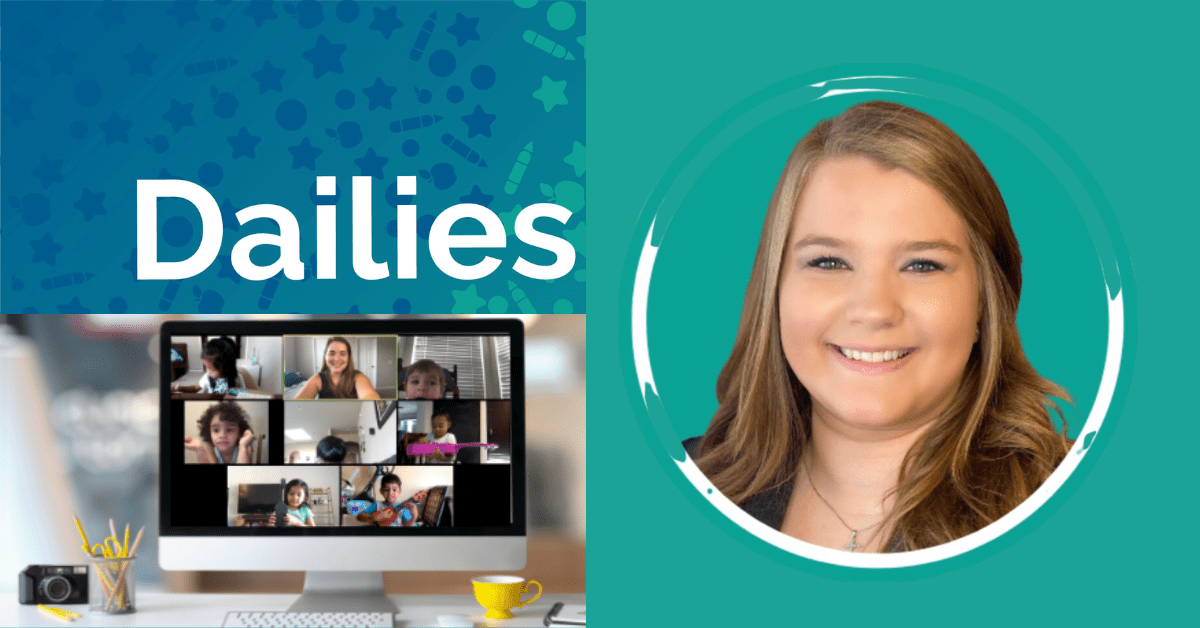
Dailies co-founder and Forbes “30 Under 30” honoree visits with Magnolia Tribune Business Columnist Phil Hardwick. She says it’s long overdue to unite the home, school, and community around our youth, to ensure a future and legacy we can be inspired by.
A Gulfport, Mississippi entrepreneur has been named by Forbes magazine to this year’s prestigious “30 UNDER 30” list for Education.
Jessica Shelley, 29, a former schoolteacher and mother of five, is the co-founder of Dailies, a two-year-old $5 million online learning company now serving over 15 thousand families worldwide.
In this Q&A interview, we discussed her company and advice for those interested in starting their own business.
How did you come up with the name Dailies for the company?
Dailies represents the frequency with which we learn new things. We know that learning happens, daily, therefore we reference it as “doing your Dailies” – the small bite-sized learning moments we can be intentional about each day.
Technology is obviously critical to your business model. Tell me a little about the role technology plays in the success of the company.
Technology is a fantastic tool that in our case, helps us have broader impact and scalability. We know that the quality of education your child receives is greatly impacted by your zip code, whereas through leveraging technology, we can reach families that may not have access to supports like ours in their area. Additionally, our vision for our learning app is that it can be completed offline so that even those with limited access to the internet, can still be learning daily.
We don’t believe that technology should replace human interaction, but rather be used to help facilitate communication and connection more easily.
How many employees does Dailies have, and what are their roles?
We have two full-time employees. They are myself, co-founder and CEO, joined by my co-founder and CTO, Manuel Zamora. We also have a group of teacher contractors who help with everything from teaching classes, curriculum, and programming oversight, and even our marketing team. We know teachers are grossly underpaid in traditional systems, so we encourage our teachers to not only teach with us but also upskill with us as we grow our organization.
Let’s talk about marketing: How do you get your customers? Your teachers?
Our customers right now are typically coming from word of mouth and organic social media. Parents innately want products and services they can trust, so we spend a lot of our time providing value in a variety of groups and contexts, to then also introduce them to the idea that we can serve them as an educational partner as well through our platform.
For teachers, we have zero issue with finding and hiring top talent. We only end up hiring about 1% of all teachers who apply due to wanting to ensure their success on the platform as well as their dedication to our vision. Our teachers primarily come to us through word of mouth and organic social media.
What start-up capital was required and how was the company funded?
When we first started out, my co-founder was able to get the preliminary funding through a small friends and family round, then we were able to receive a bit of funding through the 500 Global Accelerator program, and now we are bootstrapped as we continue to scale. Since we started with our learning app, most of the funding went toward our development and the team needed to help build our online class platform.
You have five kids and you’re the CEO of a growing company. How do you manage your time?
Intentionally. There are times that I set aside for each and times when I know I can be more fluid, or “in the moment”. For example, Friday nights are a non-negotiable family night. I will never take a work call. When I travel for work, I can’t be “mom” at home, so it’s all a balance between what is the most urgent need combined with what is already allocated each day/week. I am also fortunate to have a very supportive husband who is our children’s primary caretaker during the workday so I can still have time to focus on the business while the family is home.
What data do you measure and what’s the most important data for any business to measure?
We measure quite a bit; however, our primary driving measures are number of users and customer lifetime value (LTV). Since education has some seasonality to it, we tend to look at these two as primary drivers for our impact, product development, and marketing efforts. Another key one is of course revenue and expenses to ensure your business is moving toward profitability, if not already there.
I think the most important data for any business to measure is going to be the customer acquisition cost (CAC) and customer lifetime value (LTV) because it is in direct relation to your business model, revenue, and product/service development. If your customer costs too much in relation to the product or service you are providing, you are making it very difficult to climb out of a negative growth pattern from the get-go.
We realized this early on when we were testing large group classes. These classes were a way that we thought could help more students and families access classes, however, it didn’t align with our mission of personalized learning because there was very little room for interaction within the classes. Our product for these was more of a webinar type of class because we could have more students for a lower cost in each class. At the time it seemed like a good idea, however, although we had more customers, we had to realize that the small amount they were paying per class was not covering the teacher pay and additional customer support overhead required for them.
It’s okay to try things and adjust, but overall, I think that CAC and LTV are two of the most important data points that drive business operations and development.
What would a teacher who wants to become a Dailies teacher do? What could they expect when they become one? Is there a limit on number of students?
A teacher who wants to teach with Dailies can visit us here to learn more about teaching with us and to apply.
Our teachers make their own schedules and have options to teach a variety of classes from enrichment offerings to academic pods, a full homeschool program, and Dailies for Schools tutoring.
There is full teacher autonomy from scheduling, classes they will be teaching, and even lesson elements/design. We don’t have scripted lessons, because we believe there are no such thing as scripted kids. Our teachers have access to programs that fit their interests and availability.
Our classes are capped at 8 students, with our average class size being between 4-6.
How do you find and qualify your instructors?
Our teachers come to us through social media or through direct referrals. The primary things that we look for in teachers who want to join Dailies are:
1. Their alignment to our teaching and learning philosophies – specifically the impact of small group and personalized learning.
2. Their comfort in teaching online and using technology tools.
3. Their general willingness to accept and provide feedback – we are all learning and growing.
4. Their teaching personality and ability to complement our class offerings and their uniqueness on the platform as an educator. We focus on ideal educator-matching so we strive for varied teaching styles.
5. Their passion for service and connection with students and families.
Has there been any criticism from schools or other educators?
Not that has been outwardly or directly said to us. Nearly all the educators and administrators we have spoken to see the need for what we are creating and are full supporters of our vision. As a former public school teacher myself, the product and service we provide is based on real problems happening in schools and homes across the country. It isn’t necessarily new information for this population, however, it is something that has come to light for parents more recently due to the pandemic.
What advice do you have for anyone starting a new business?
Take time to plan and be intentional about your general strategy. If you just jump in and hope that you will get customers by posting on your social media, you may be hit with the stark reality that it isn’t as easy as it may seem. I think on the flip side of that, is to also leverage social media. This is where people are, so you have to be there too.
The power is in the details of what your product or service provides. Get your differentiators down early and carve out your spot in the market. Be uniquely you the entire way and focus on your customer at every step.
What are your future plans for the company?
Our plans are focused on impact. Our immediate goal is to reach more families through partnerships with local public, private, and charter schools to provide learning support services in 2024. We also have a dedicated focus on growing our partnerships with families directly as well.
Families are invited to try a free class here.
It’s long overdue to unite the home, school, and community around our youth, to ensure a future and legacy we can be inspired by.











